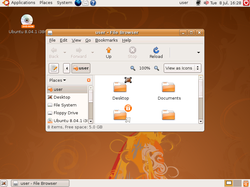
This is a list of companies, organizations and individuals who have moved from other operating systems to Linux. On desktops, Linux has not displaced Microsoft Windows to a large degree. However, it is the leading operating system on servers. [1]
Contents
- Government
- Africa
- Asia
- Americas
- Europe
- Education
- Europe 2
- Americas 2
- Asia 2
- Russia 2
- Home
- Businesses and non-profits
- Scientific institutions
- Celebrities
- See also
- References
See also : List of BSD adopters


